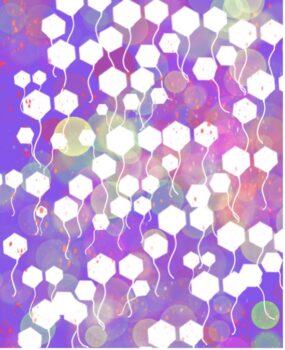
The Science
Microbial communities pervade everything from soil, air and water to humans and animals. We are made up of, and are covered by, a microbial jungle. Bacteriophages (also known as phages)- viruses that infect bacteria– are the most abundant biological entities in this dense network and generally infect only specific bacteria strains. Decades of work has shown phages to be crucial members of these microbial communities;impacting everything from human health to nutrient cycles. Despite their importance, very little is known about who they infect, how they take over the target host and kill them. Critically, which phage genes are essential for infecting bacteria are unknown. Here we developed a new CRISPR-based technology to reduce the expression (also known as “knockdown”) of every gene in phages to determine essentiality; and as a proof of concept, apply this technology to two model phages.
We assessed the feasibility of using a CRISPR-based system for performing a genome-wide survey of 2 paradigm phages, lambda and P1. Studied over 5 decades, the coliphage lambda, is arguably the best characterized virus in terms of individual gene function and developmental pathways, while the coliphage P1 is a powerful generalized transducing phage instrumental in the development of E. coli as a primary genetic model.
The Impact
One of the key goals of the ENIGMA-SFA program is to develop a mechanistic understanding of microbial community dynamics and function within the contaminated Bear Creek aquifer at the Oak Ridge Reservation. Towards this goal, ENIGMA researchers are studying the critical role played by phages as ecological drivers of microbial communities in the heavy metal contaminated soil and water bodies such as Oak Ridge Reservation field site. As new phages are isolated from the field site, there is a need for high-throughput technologies to rapidly characterize phage genes and their functional role in infection cycles. To address this need, we developed a CRISPR-based technology to assess which phage genes are dispensable for successful phage infection cycles. That is, by reducing the expression of individual phage genes, we could characterize which of them are nonessential and can be eliminated by phage engineering approaches. Such a systematic approach helps in harnessing phages as engineerable antimicrobials and use them for editing microbial communities in diverse applications. As a proof of principle, we demonstrate this by inserting a DNA barcode into the lambda and P1 genome at an inessential region that provides the ability to track and quantify distinct phages in a mixed phage formulation. This work paves the way for studying phage genes involved in other functional roles and use them for applications to interrogate microbial interactions.
Summary
By applying the CRISPR-based technology to two well-known model phages, lambda and P1, we demonstrate that our results are consistent with known assignments of gene essentiality in both phages, provide novel insights, and present a genome-wide landscape of gene essentiality for phage P1 for the first time, to the best of our knowledge. Our results show that the CRISPR knockdown method is suitable for probing stretches of nonessential genes in these phages. With an organized map of gene essentiality in hand, it is now possible to identify locations in these phage genomes that are not essential and can be replaced with genetic “payloads” for a number of applications. Finally, this study also uncovers unintended gene expression effects and we recommend caution towards interpreting essential gene assignments when applied to less studied phages.
Read more on the Biosciences Area website.
Also highlighted by DOE Deciphering the Functions Encoded in Phage Genomes

Contact
Vivek K Mutalik, Staff Scientist in the Environmental Genomics & Systems Biology Division
Lawrence Berkeley National Laboratory
vkmutalik@lbl.gov
Publications
Piya, D.; N. Nolan, M.L. Moore, L.A. Ramirez Hernandez, B.F. Cress, R. Young, A.P. Arkin, V.K. Mutalik (2023) Systematic and scalable genome-wide essentiality mapping to identify nonessential genes in phages. PLoS Biology. https://doi.org/10.1371/journal.pbio.3002416 OSTI:2228323
